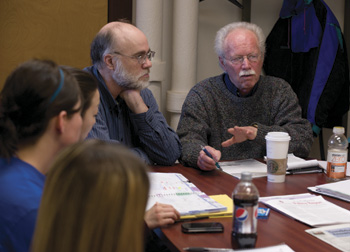
Edward Erwin, left, is seen with instructor David LeCount and the field seminar class for social work students.
“These social work students are bright and committed,” said Edward Erwin (’06 BA, ’07 MSW). “They could be doing anything—medical school or whatever. In the physical sciences, we assume the simplest solution is the best. In social work, you need to assume complexity. Social work is an art form.”
Erwin knows social work, and he knows these students. He earned his bachelor’s and master’s degrees from the University of Wisconsin-Madison School of Social Work. He now spends two hours every week during the academic year with the students in their classroom, co-facilitating discussion with instructor David LeCount, teaching the field seminar class to prepare for working with adults with serious and persistent mental illness. A challenging path for anyone, it is all the more remarkable when you learn Erwin has schizophrenia.
Erwin was given the prestigious Mary Ann Test Service Award in 2010 to recognize his work and his impact on students and peers. Professor Emerita Mary Ann Test was one of the pioneers of the Program for Assertive Community Treatment (PACT). In addition to recognition, the Test award funded a stipend for Erwin’s work in the classroom. The award is supported entirely by gifts.
Professor Emerita Mona Cantor Wasow is one of many donors to the award fund and knows Erwin. “PACT got professionals out of their offices during the deinstitutionalization movement in the 1970s and ‘80s, and now the World Health Organization promotes PACT as the ideal all over the world,” Wasow said. “Ed is an example of the positive and humane way professionals can step in and help before things get critical. Ed has struggled against the deficits of severe mental illness. These are lifelong, chronic and serious illnesses. Boy, do I admire him.”
Megan Smits (x’11) is a student in the field seminar class. “He gives you a lot of wisdom from his personal experiences,” she said. “I’ve gotten a lot of valuable insight, and I really appreciate Ed’s working to help other consumers (of mental health services) and students who will be social workers. He adds a different dimension to the class. I’ve always known this is what I wanted to do, but this has helped me understand in a more reality-based way what it would be like. This experience has definitely impacted my ideas of what I want to do.” Smits graduated in May and is seeking a social work position in the field of mental health.
“Most social workers care very deeply,” said Erwin. “It is incredible how much you can accomplish just by caring.”
